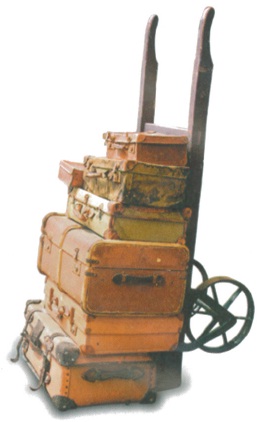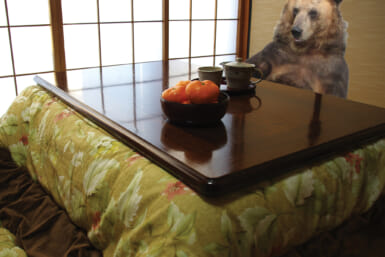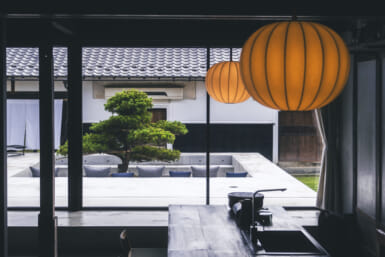Suzy Small on the mixed blessing of having your nearest and dearest come to stay
Living in a foreign country can be an amazing experience, but one of the downsides is definitely being away from your friends and family. Japan still has a reputation for being a difficult and expensive place to travel, so it can take some work to convince the people you miss most to come and visit. It’s always exciting when your emails and phone calls, singing the praises of Japanese food, people and culture, finally persuade the people you miss the most to plan a trip here. But it can be a shock to find that, as hard as it is not seeing your friends and family, having them come and visit you can be tough, too. If you bring up the topic of visitors with other foreigners living here, they almost always have a horror story to tell!
Houseguests are stressful in any country, but when you factor in tiny Tokyo apartments and the long hours that many people work here, it’s enough to test even the closest relationship. However, a lot of angst can be avoided if you are honest with your visitors from when they first start planning their trip. Let them know if there are any parts of the year that are really inconvenient for you, so that they can come at a time when you’ll be able to enjoy their company — it’s no good if your friends have their hearts set on the cherry blossom season and that coincides with you starting a new job. Communication is also important while your visitors are here. There’s nothing worse than having 20 minutes to get ready for work and finding that your mum has commandeered the hairdryer, and dad is happily singing away in the shower. When your guests arrive, it’s worth taking time to explain the basics, like how to sort the garbage, where you keep the tea and coffee, and what time you need to use the bathroom in the morning. You might feel a bit bossy, but it will save aggravation later on, and people are often more relaxed and able to look after themselves if they know what’s expected of them.
Lots of first-time visitors to Japan are worried about finding their way around, but they are usually able to be quite independent once they’ve recovered from their jetlag and found their bearings. If you let your visitors know at the start of their trip when you’ll be free to show them around and when they’ll need to amuse themselves, it will help them plan their time better. There are also simple things you can do to help.
“I bought a notebook and wrote phrases for my parents in English and Japanese — it really helped them to get around smoothly,” recommends Jane, a long-term British resident. “Picture menus, very helpful Japanese people, English words dotted here and there, all seem to add up to enough to get by.” added Alice, an Australian who’s been here for five years and had seen her fair share of visitors. Some visitors will have more trouble than others, though, and sometimes even if you draw maps and provide guidebooks and Japanese phrases, they still find it hard to cope. In this case it could be worth organizing a tour guide, which doesn’t have to be expensive. “Edo Goodwill Guides are fabulous. They have a pool of Japanese women who want to practice their English skills, and enjoy showing foreigners around Tokyo. They are not professional tour guides, and much more personal — it is like having a friend show you around,” Catherine, another long-term British resident, suggests. If you’ve been here a while, and have had a few visitors it can quickly become boring going to the same places over and over again. Fortunately, the bigger tourist attractions are often the easiest places for visitors to go. You could suggest they do Asakusa, Meiji Jingu and Ginza while you’re at work, and then in your time together you can take them to places they might not have discovered otherwise — the back blocks of Omotesando and Harajuku make great pottering, and the yaki-tori stalls under the tracks at Yurakacho are a unique Tokyo experience. Theme bars are often a big hit too, and karaoke is great — despite initial reservations most visitors love it. We residents sometimes get stuck in a rut, so having visitors can force us to get out and explore new bits of the city can be a blessing. “You can be a naff tourist and do things you wouldn’t normally do — like the rickshaw ride in Asakusa!” Sally, an Australian based in Tokyo, admitted.
Although it takes some work, having visitors can be a great experience. As well as the joy that comes from spending time with your good friends and family, having people visit you here has two main benefits. First, sharing the city with people from your home country means that they can understand your life here better and, once they leave, your emails and photos will mean much more to them. Also, showing visitors around lets you see the city with fresh eyes. “I will do anything for the guest who appreciates the wonders of Japan. It reminds me why I came here, and how passionate I am about it,” Emma comments. “It’s fun to watch how shocked they are by everything — even the smallest things, like umbrella bags when it rains; things we take for granted,” Sally adds. It’s also a nice feeling when you realize, after seeing how newcomers experience the city, how far you’ve come since you first arrived and that, at least for now, Tokyo has become home.
Seasonal activities:
Fireworks festivals, cherry blossom viewing and sumo. Yakitori in Golden Gai.
Hato Bus
English tourbus company that visits all major tourist sites.
www.hatobus.co.jp









